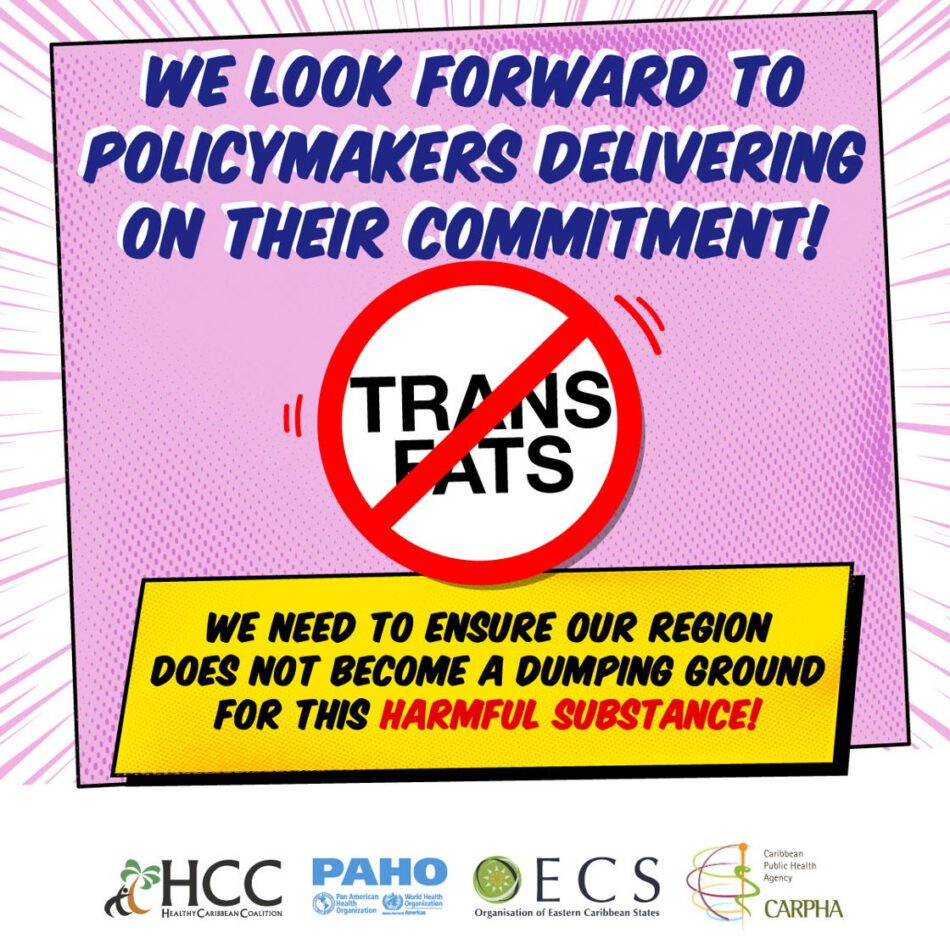HCC and Partners Launch Campaign: Let’s Talk About Trans Fats! And Why They Need to Go!

Did you know that the very foods you eat daily may contain harmful chemicals silently increasing your risk of heart attack or stroke? Industrially-produced trans fats—often lurking in packaged and processed foods— are among the dangerous ingredients in our diets today. As the December 2025 deadline for eliminating these harmful fats from our food supply in the Caribbean approaches, the Healthy Caribbean Coalition (HCC), with the support of Resolve to Save Lives and partners[1], is pleased to launch the campaign titled “Let’s Talk About Trans Fats! And Why They Need to Go!” on September 30th, 2024. The campaign is part of a larger regional movement to ban industrially-produced trans fats from the food supply, which has proven to be cost-effective in protecting lives and reducing the burden of non-communicable diseases (NCDs) across the Caribbean. Eliminating trans fat reduces health care costs by preventing heart attacks, which require costly care.
This campaign comes on the heels of Caribbean Wellness Day, celebrated annually in September, under the theme “Power Through Collective Action: Good Health is Our Right.” This theme emphasises the importance of collective efforts to address NCDs and safeguard public health, reinforcing the fundamental right to health for all individuals.
The consumption of industrially produced trans fats has been linked to increased risks of heart attacks, strokes, and other NCDs and causes an estimated 278,000 deaths annually from coronary heart disease (CHD) globally. In 2022, Caribbean policymakers committed to eliminating partially hydrogenated oils (PHOs), the primary source of industrially produced trans fats, from national and regional food supplies by December 31, 2025. This commitment is grounded in the right to health, ensuring that citizens are not exposed to harmful substances in their food.
Dr. Kenneth Connell, President of the HCC, highlighted the urgency of action:
“This campaign is a wake-up call for the region. Industrially produced trans fats are a silent danger, contributing to the rising incidence of heart disease and strokes in our communities. Our goal is to encourage policymakers to expedite the elimination of these harmful fats while informing and empowering people to demand healthier, safer food choices.”
Building on this, Dr Juan Manuel Sotelo, PAHO Caribbean Subregional Programme Interim Director, emphasised the importance of aligning with global efforts:
“Globally, 58 countries have already passed best practice policies, covering 47% of the world’s population and preventing nearly two-thirds of deaths caused by trans fat each year. It is crucial that the Caribbean swiftly aligns with these global efforts to protect the health of its people.”
The campaign has also received widespread support from key regional organisations. Dr Heather Armstrong, Head of the Chronic Disease and Injury Department at CARPHA, underscored the importance of this regional initiative:
“CARPHA fully supports the effort to remove harmful trans fats from the Caribbean food supply. This campaign will build momentum as we approach the 2025 deadline, ensuring that the people of the Caribbean are not left vulnerable to preventable diseases caused by unhealthy dietary practice.”
Dr Didacus Jules, Director General of the OECS Commission, also voiced strong support for the campaign:
“The fight against trans fats is a crucial part of our region’s health agenda. By supporting the ‘Let’s Talk About Trans Fats’ campaign, we are advancing the Caribbean’s goal of promoting sustainable health systems that prioritise the well-being of every citizen.”
The “Let’s Talk About Trans Fats! And Why They Need to Go!” campaign is a powerful call to CARICOM Member States to urgently accelerate the implementation of national legislation to eliminate harmful trans fats from our food supply. This effort builds on HCC’s ongoing advocacy for a comprehensive package of healthy food policies including taxation of sugar-sweetened beverages, restricting the sale and marketing of ultra-processed products to children through national school nutrition policies and empowering consumers through octagonal front of package nutrition warning labelling. The campaign highlights the central role of Governments in creating health-supporting environments through evidence-based regulation and the critical role of diverse partners in supporting Government action. It highlights the fundamental right of every Caribbean citizen to healthy nutritious food as a key building block for a healthy life free from preventable diseases caused by unhealthy food environments. Achieving the goal of eliminating industrially produced trans fats by 2025 will require collective and collaborative efforts from governments, civil society, and the private sector across the region.
Note:
[1] the Caribbean Public Health Law Forum (CPHLF), the Caribbean Public Health Agency (CARPHA), the Pan American Health Organization (PAHO), the Organisation of Eastern Caribbean States (OECS) Commission, the Law and Health Research Unit (LHRU) of the University of the West Indies, Barbados, the Heart and Stroke Foundation of Barbados (HSFB), Healthy Bahamas Coalition (HBC), Heart Foundation of Jamaica (HFJ), Lake Health and Wellbeing of St. Kitts and Nevis, and the St. Lucia Diabetes & Hypertension Association (SLDHA).
FROM
Dorial Quintyne
Project Coordinator, Healthy Caribbean Coalition
Malika Thompson-Cenac
Communications Specialist, Organisation of Eastern Caribbean States





